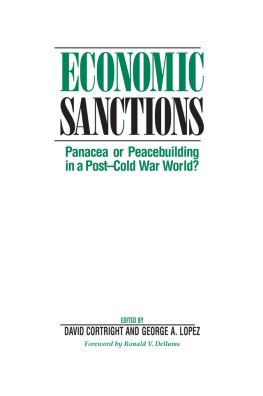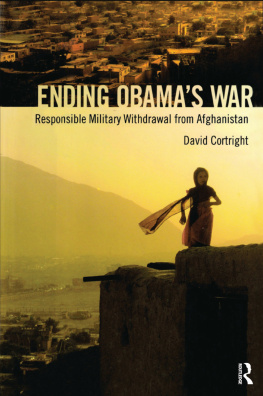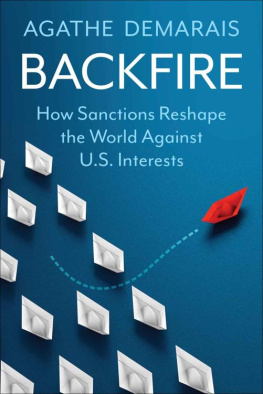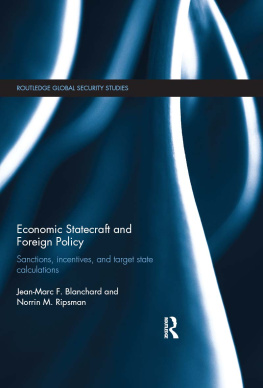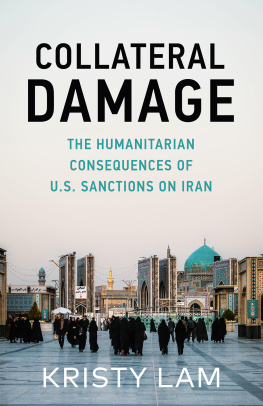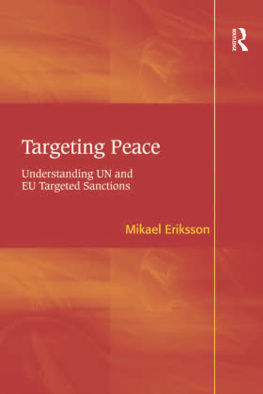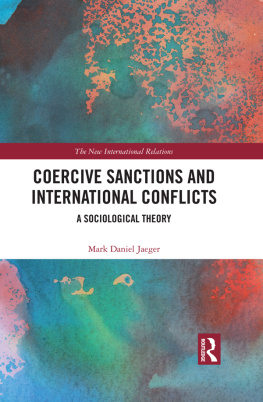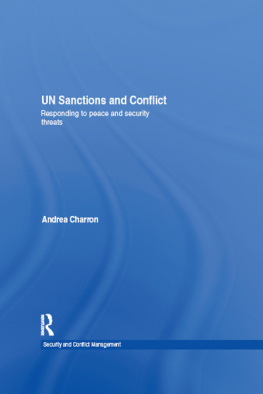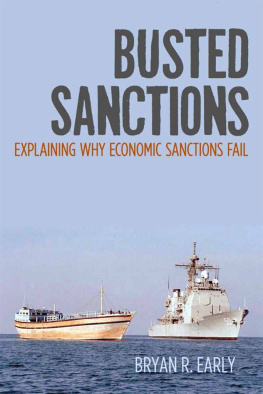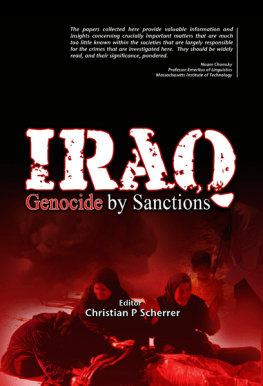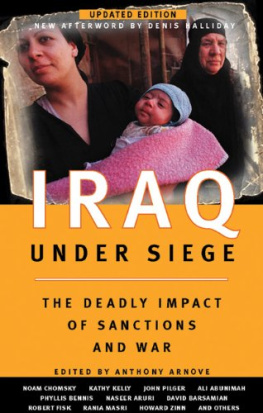All rights reserved. No part of this book may be reprinted or reproduced or utilised in any form or by any electronic, mechanical, or other means, now known or hereafter invented, including photocopying and recording, or in any information storage or retrieval system, without permission in writing from the publishers.
Contents
PART ONE
International and National Experiences with Sanctions
, George A. Lopez and David Cortright
, James C. Ngobi
, Ivan Eland
, Alexander Konovalov, Sergey Oznobistchev, and Dmitry G. Evstafiev
PART TWO
Assessing Sanctions
, Kimberly Ann Elliott
, William H. Kaempfer and Anton D. Lowenberg
, Christopher C. Joyner
, Jack T. Patterson
, Drew Christiansen, S.J., and Gerard F. Powers
PART THREE
Case Studies
, David E. Reuther
, Bashir Al-Samarrai
, Susan L. Woodward
, Sonja Licht
, Claudette Antoine Werleigh
, Jennifer Davis
PART FOUR
The Future of Sanctions
, Lloyd (Jeff) Dumas
, David Cortright and George A. Lopez
Guide
When I first arrived in the United States Congress in 1971, I introduced legislation into the House of Representatives that would impose economic sanctions against the racist apartheid regime in South Africa. I believed that a U.S. determination to sever economic links with South Africa, and to strengthen the effect of that resolve by pressing for international sanctions that would economically isolate the regime, provided the surest and most morally compelling avenue to end the consistent pattern of gross violations of internationally recognized human rights imposed under apartheid doctrine.
Fifteen years later, amid a national hue and cry for economic disinvestment from South Africa, the Dellums bill to impose sanctions against South Africa finally passed the House of Representatives and sanctions became United States law over the veto of then President Ronald Reagan. I believe to a certainty that the passage of the sanctions law and the heightening of international efforts to isolate South Africa's apartheid government contributed significantly to the watershed political changes that have occurred on that portion of the African continent.
As I stood in Pretoria to witness the inauguration of President Nelson Mandela, I reflected on the positive contribution that the international sanctions effort had made in accelerating the inevitable coming to power of a government in South Africa based on the principle of nonracial democracy. What also seemed clear was that the timely and deliberate use of economic sanctions had mitigated against the possibility that this inevitable celebration might have come as a result of a further protracted and deadly violent armed struggle, fought to a bitter conclusion with all of the lingering consequences that would militate against reconciliation and national development.
In a very different context, I also supported the use of an internationally based economic sanctions strategy to dislodge the Iraqi forces from their conquest and illegal occupation of Kuwait. In the congressional debate about whether to authorize President Bush's undertaking of offensive military actions against Iraq, I pleaded that sanctions be given the opportunity to achieve their objective. To do that, I argued, would mean giving sanctions at least the twelve to eighteen months recommended as a minimum by experts to create enough economic pressure on the Iraqi regime to persuade its military to leave Kuwait without allied forces having to commence offensive military operations.
Thankfully the fearful predictions of massive allied casualties in the war that followed did not come to fruition. Nonetheless, tens of thousands of Iraqis were killed, a dramatic loss of life that may have been avoided had we abided the appropriate period of time to see whether the sanctions would obtain their stated objective.
Sanctions in a Changed World
The eventual and nearly unanimous world condemnation of South Africa, and sanctions against that country, were notable exceptions to the Cold War-era split that had divided the world community into East, West, and the nonaligned. This split often prevented the use of concerted worldwide action to meet humanitarian, peacekeeping, and human rights challenges and thereby forestall armed conflict. The sanctions against Iraq were trumpeted as part of the "new world order" (a phrase that means many different things depending on one's vantage point) made possible by the end of the Cold War.
There seems to De a consensus that the last decade of this century will be seen as a historic turning point for humanity. We have witnessed the end of the costly, dangerous, and sometimes deadly standoff between East and West. Former declared enemies of the Westthe Soviet Union and the Warsaw Treaty Organizationhave dissolved. Democratic governments have emerged where they had not previously existed throughout Europe, as they have also in Africa, Asia, and the Americas. Despite having faced each other for decades across mine- and barbed wire-laden military lines, U.S. and Russian troops now train and deploy together in peacekeeping operations. Much of Eastern and Central Europe and the former Soviet Union have now joined with the North Atlantic Treaty Organization in new "partnerships for peace" that promise to promote stability within the region.
Yet the post-Cold War years have also brought new challenges to the forefront of international politics. Civil wars, gross human rights abuses, regional conflicts, "ethnic cleansing," starvation and famine, and environmental catastrophes all pose challenges to international norms and place important demands on national and international systems. These demands require unprecedented and innovative responses from political and economic organizations that are themselves in transition. Much of this turmoil reflects the legacy of the Cold War and of the scores of conflicts of the past forty years.
The end of the Cold War era has instilled new life and potential viability into the United Nations, our most important international institution. No longer paralyzed by almost automatic superpower vetoes in the Security Council, the United Nations is finally able to frame a more constructive and increasingly complete set of responses to violations of international norms of behavior. On August 6,1990, for example, Resolution 661 banned UN member exports to Iraq of any conventional military equipment or technology, as well as imports of oil from Iraq. Not only was this a clear signal of international condemnation of Iraq's invasion of Kuwait, it was an attempt to reverse the transgression by means other than war.

